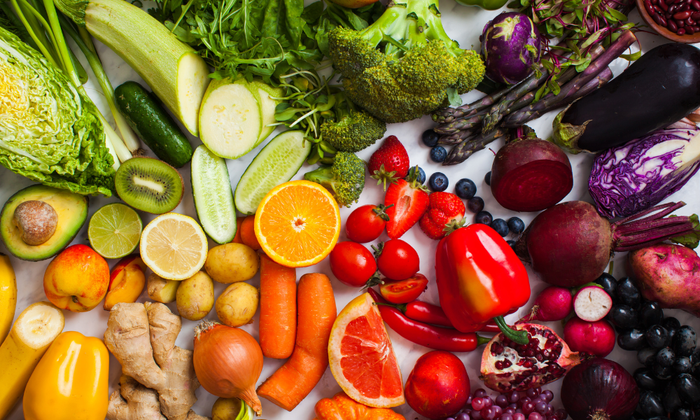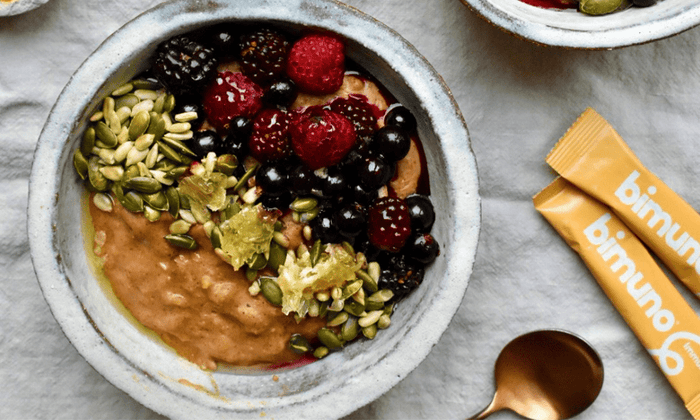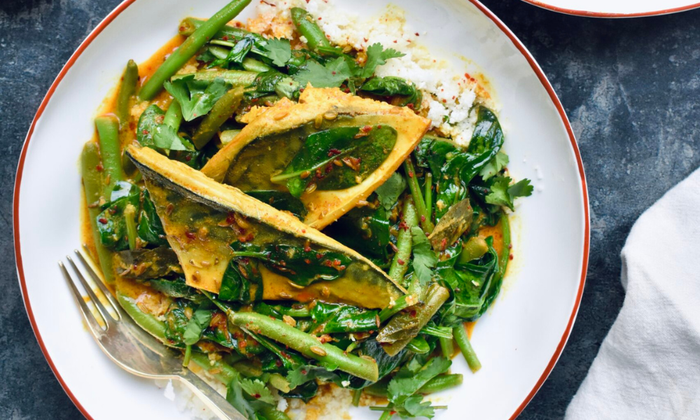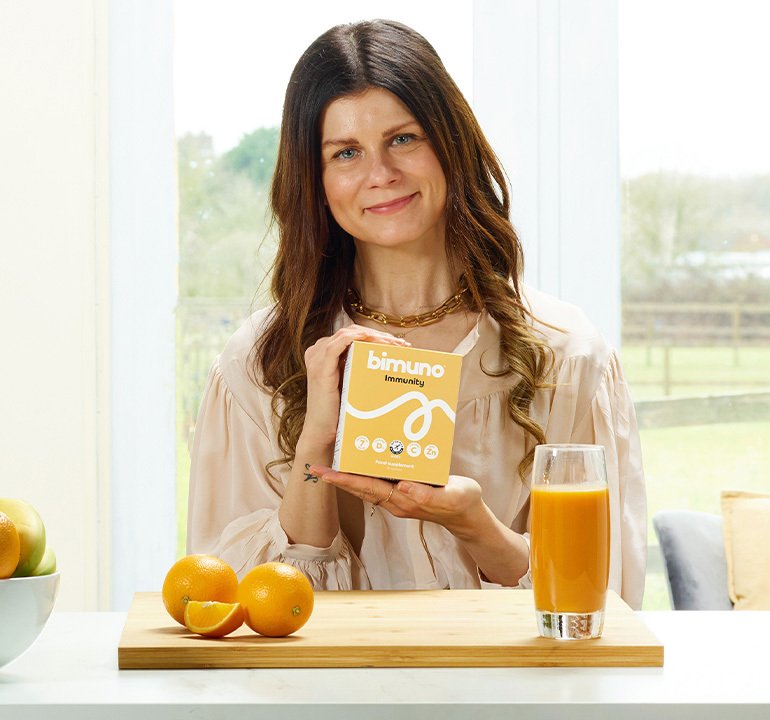
There can be a tendency to focus on getting our immune system in tip top shape ahead of the Autumn and Winter months to try and avoid the ubiquitous colds and flu. However, many immune related symptoms and conditions occur throughout the year. Allergenic conditions such as hay fever or hives for example, skin symptoms such as rashes all depend on a healthy immune system and are not subject to a specific point in the year. This is why we have to take much more of a consistent approach if we want to look at optimising our immunity all year around. How can we do that? …
1. Make your plate full of colour
Focusing on eating the rainbow and embracing a melody of colourful fruit and vegetables into our diet means we will be taking in a broad range of antioxidants and phytochemicals. These are special plant chemicals that often give plants their vibrant colours and which also have immune supportive benefits. Furthermore, a diversity in plant foods will provide a wider range of fibre, including prebiotic fibre which can feed the microbes in our gut. Since 70-80% of our immune system is located and managed in our gut, and very much depends on the health of the gut microbiome, it is very important we keep these guys well-nourished if we want a healthy immune system.

2. Focus on zinc and vitamin C rich foods
Two key nutrients when it comes to our immune health are zinc and vitamin C. Vitamin C is found in strawberries, kiwi, avocado, broccoli, rocket, all types of peppers, spinach and citrus fruits like lemons, limes and grapefruit. The least cooked the better when it comes to vitamin C as it is impacted by heat. Zinc is abundant in red meat, shellfish and pumpkin seeds and it is one that we can sometimes struggle to meet through our diet alone. This is where Bimuno Immunity can be a great way to help you meet both your vitamin C and zinc needs.
3. Add in herbs and spices
Not only do herbs and spices add more flavour to our meals but many of them contain certain compounds that help to support our gut and our immune system. Think about including herbs such as rosemary (lovely with spring lamb), thyme, oregano and spices such as cinnamon, ginger, chilli and cardamom. Try my Gingerbread porridge recipe for Bimuno which contains a myriad of spices.

4. Include fermented foods
Some fermented foods contain live microbes that can be beneficial for our gut health, which in turn can help to support our immune system. In particular, those made through lacto-fermentation, such as sauerkraut or kimchi are also rich in vitamin C. Think about stirring these through spring inspired salads or serving at the many BBQ’s over the summer months. Why not also try making a delicious dressing by mixing sweet miso paste and tahini with lemon juice which you can drizzle over vegetables, salads, fish or meat…pretty much anything. If you need some inspiration, try some healthy recipes from Bimuno here.
5. Increase omega 3’s
Omega 3 fatty acids play an important role in supporting our immune system and are considered essential nutrients as they need to be obtained through our diet. The highest sources of these can be found in oily fish such as salmon, mackerel, sardines and anchovies. Lesser so, and in a different form, they can also be found in flax and chia seeds. Something like my Coconut mackerel curry can be a fresh and vibrant way to add more omega 3’s into your diet.

6. Practise mindful drinking
Whilst an alfresco glass of wine can be something to enjoy as the weather warms up, having too much has many downsides including the health of our immune system. In fact, certain types of alcohol, including wine, contain high levels of histamine that can further exacerbate certain immune conditions such as hay fever, asthma and hives. Alcohol, in excess, can also increase inflammation which can have an impact on the health of our gut microbiome and gut barrier, which could compromise functioning of the immune system. Less is more is definitely the mantra here. Plus, there are so many exciting and delicious non-alcoholic alternatives. If you want some inspiration, check out my Paloma recipe which is perfect for summer nights.
7. Get outside
Being outdoors has a myriad of benefits for our immune system, such as helping us to get more sunlight exposure which supports our circadian rhythms and helps us to get more exercise. One of the key vitamins we need for our immune health is vitamin D, which we get predominantly from sunlight exposure. As the days get longer with the seasonal shift, we should aim to get outside more often. During the winter months, especially if you live in the UK, it can be difficult to get adequate sunlight exposure. Light exposure in the morning may also help to support our natural circadian rhythms that govern the sleep-wake cycle, and we know that sleep is one of the key pillars of health when it comes to our immune system. Furthermore, engaging in moderate physical activity such as walking has also shown to have a positive impact on our immunity. You can also find 100% of your recommended daily intake of vitamin D in Bimuno Immunity.

8. Book a holiday
Which doesn’t have to be somewhere really exotic as a staycation can be just as restorative. The point really is that we need to make sure we allow sufficient periods of rest and to reduce stress when we are looking to support our immune system. Chronic stress and the many negative health correlations associated with it can reduce our resilience which can impact on our immune health, so it is important that we prioritise holiday periods to allow us to fully recharge.
Yahfoufi N, Alsace N, Jambi M & Matar C (2018) ‘The Immunomodulatory and Anti-Inflammatory Role of Polyphenols’ Nutrients. 2018 Nov 2;10(11):1618. doi: 10.3390/nu10111618. Available online at https://pubmed.ncbi.nlm.nih.gov/30400131/
Wastyk HC et al (2021) ‘Gut-microbiota-targeted diets modulate human immune status’ Cell. 2021 Aug 5;184(16):4137-4153.e14. doi: 10.1016/j.cell.2021.06.019. Epub 2021 Jul 12. Available online at https://pubmed.ncbi.nlm.nih.gov/34256014/
Carr AC & Maggini S (2017) ‘Vitamin C and Immune Function’ Nutrients. 2017 Nov 3;9(11):1211. doi: 10.3390/nu9111211. Available online at https://pubmed.ncbi.nlm.nih.gov/29099763/
Rink L & Gabriel P (2000) ‘Zinc and the immune system’ Proc Nutr Soc. 2000 Nov;59(4):541-52. doi: 10.1017/s0029665100000781. Available online at https://pubmed.ncbi.nlm.nih.gov/11115789/
Isbill J, Kandiah J & Kružliaková N (2020) ‘Opportunities for Health Promotion: Highlighting Herbs and Spices to Improve Immune Support and Well-being’ Integr Med (Encinitas). 2020 Oct;19(5):30-42. Available online at https://pubmed.ncbi.nlm.nih.gov/33488303/
Shahbazi R et al (2021) ‘Anti-Inflammatory and Immunomodulatory Properties of Fermented Plant Foods’ Nutrients. 2021 Apr 30;13(5):1516. doi: 10.3390/nu13051516. Available online at https://pubmed.ncbi.nlm.nih.gov/33946303/
Gutiérrez S, Svahn SL & Johansson ME (2019) ‘Effects of Omega-3 Fatty Acids on Immune Cells’ Int J Mol Sci. 2019 Oct 11;20(20):5028. doi: 10.3390/ijms20205028. Available online at https://pubmed.ncbi.nlm.nih.gov/31614433/
Barr T, Helms C, Grant K & Messaoudi I (2016) ‘Opposing effects of alcohol on the immune system’ Prog Neuropsychopharmacol Biol Psychiatry. 2016 Feb 4;65:242-51. doi: 10.1016/j.pnpbp.2015.09.001. Epub 2015 Sep 14. Available online at https://pubmed.ncbi.nlm.nih.gov/26375241/
Baeke F, Takiishi T, Korf H, Gysemans C & Mathieu C (2010) ‘Vitamin D: modulator of the immune system’ Curr Opin Pharmacol. 2010 Aug;10(4):482-96. doi: 10.1016/j.coph.2010.04.001. Epub 2010 Apr 27. Available online at https://pubmed.ncbi.nlm.nih.gov/20427238/
Lange T, Dimitrov S & Born J ‘Effects of sleep and circadian rhythm on the human immune system’ Ann N Y Acad Sci. 2010 Apr;1193:48-59. doi: 10.1111/j.1749-6632.2009.05300.x. Available online at https://pubmed.ncbi.nlm.nih.gov/20398008/
Wang J, Liu S, Li G & Xiao J (2020) ‘Exercise Regulates the Immune System’ Adv Exp Med Biol. 2020;1228:395-408. doi: 10.1007/978-981-15-1792-1_27. Available online at https://pubmed.ncbi.nlm.nih.gov/32342473/
Dragoş D & Tănăsescu MD (2010) ‘The effect of stress on the defense systems’ J Med Life. 2010 Jan-Mar;3(1):10-8. Available online at https://pubmed.ncbi.nlm.nih.gov/20302192/

Related Articles








